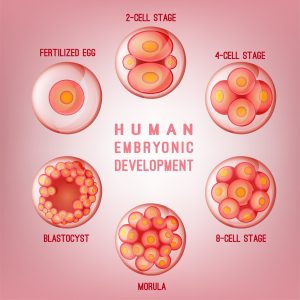By now we have all heard of the Alabama Supreme Court decision holding that frozen embryos are “unborn children” under Alabama State Law. This was the holding in LePage v. Center for Reproductive Medicine, issued on February 16, 2024. Although much hay was made out of a concurring opinion that quoted the Bible extensively, the primary opinion was based squarely on Alabama State Law only, specifically the Alabama Wrongful Death of a Minor Act. You can read the full, actual opinion here.
In LePage, three couples had their frozen embryos destroyed in an incident at a fertility clinic. The plaintiffs in the Alabama case had undergone IVF treatments that led to the creation of several embryos, some of which were implanted and resulted in healthy births. The couples paid to keep other embryos frozen in a storage facility at the Mobile Infirmary Medical Center. A patient in 2020 wandered into the area and removed several embryos, dropping them on the floor and “killing them.”
The justices ruled that wrongful death lawsuits by the couples could proceed. Justices, citing anti-abortion language in the Alabama Constitution, ruled that an 1872 state law allowing parents to sue over the death of a minor child “applies to all unborn children, regardless of their location.””Nothing about the [Wrongful Death] Act narrows that definition to unborn children who are physically “in utero.”
Immediately after the Alabama Supreme Court Ruling in LePage, many Alabama fertility clinics suspended their practices, in fear that all of the embryos they were storing for patients, by contract, were now considered unborn children for which the clinics could be criminally prosecuted for anything that happened to them or destruction of them, accidental or intentional. Many women who had their embryos stored in Alabama fertility laboratories immediately attempted to have their embryos moved from Alabama to another state, any other state, that didn’t agree with Alabama that frozen embryos are unborn children under the Wrongful Death of a Minor Act.

I currently represent a couple in a case pending in Gwinnett County State Court, just like the Alabama couples who lost their embryos. In my case, Moller v. Reproductive Biology Associates, CIVIL ACTION FILE NO. 21-C-08075-S3 my clients’ two frozen embryos were destroyed by laboratory staff, even though my client was undergoing the extensive and intrusive year-long medical protocol to have the embryos transferred, which means placed in her uterus to become fetuses. On the very day my client called to schedule the medical procedure to have the embryos transferred (placed) into her uterus, she was told her embryos had actually been discarded. You can imagine the trauma this caused to my clients. These were their last two embryos.
The Georgia Legislature earlier had passed a “trigger law” that would go into effect immediately and automatically in the event Roe v. Wade were ever overturned. Georgia enacted the Living Infants Fairness and Equality (LIFE) Act (known as “The Georgia LIFE Act”) in 2019. LIFE is an acronym for”Living Infants Fairness and Equality Act.” 2019 Ga. Laws Act 234 (H.B. 481). Section 3 of the Act amends the definition of “[n]atural person” in the Georgia Code to mean “any human being including an unborn child.” Id. § 3(b). And it defines “[u]nborn child” as “a member of the species of Homo sapiens at any stage of development who is carried in the womb.” Id. § 3(e)(2). SisterSong Women of Color Reprod. Justice Collective v. Governor of Georgia, 40 F.4th 1320, 1324 (11th Cir. 2022). The Eleventh Circuit recently held this definition was not void for vagueness on its face. Id.
The statute carefully defines “unborn child” as “a member of the species of Homo sapiens at any stage of development who is carried in the womb.” The Act did not use language to indicate the member of the species of Homo sapiens must be being carried in the womb at that very moment at issue. Rather, it was carefully drafted to carry out the full intent of a conservative Georgia Legislature to recognize life begins at conception and to protect an embryo wherever that embryo may be. Had the Georgia Legislature intended the definition of “unborn child” to apply only to fetuses currently being carried in the womb, it would have said just that, i.e., it would have defined “unborn child” as a member of the species Homo sapiens at any stage of development who is currently being carried it the womb at the time at issue. It chose not to do so.
Other states that wanted to clarify that personhood applied only if the embryo was already implanted in the womb used other language. For example, the State of Arizona Legislature amended its criminal code to expand the definition of criminal homicide to include deaths of an unborn child “in the womb at any stage of its development.” Jeter v. Mayo Clinic Arizona, 211 Ariz. 386, FN 4. (2005)(emphasis added). Had the Georgia Legislature wished the Georgia Life Act to apply only to embryos in the womb at the time, it would have used similar language to that as the Arizona statute. It intentionally chose not to.
A frozen embryo is a fully fertilized embryo, frozen at the stage of development called a “blastocyst,” having already doubled into approximately 128 cells at the time of freezing, about five days after fertilization. The blastocyst cells contain pleuripotential cells, meaning cells that can differentiate into many different parts of a human body. This naturally included cardiac cells, that, ultimately grow further to become a fetus’s heart.
The Georgia Life Act does not further define “embryonic cardiac activity.” Under the most broad, inclusive definition, it could mean the differentiation of the embryonic cells into cardiac cells, as early as just a few days after fertilization, as science knows that is what occurs. The “freezing” or cryopreservation of the fertilized embryo that is doubling in size every day and whose 128 cells have already begun differentiating into cardiac cells simply stops further differentiation at a moment in time, until the embryo is thawed and transferred into a vessel (a uterus) for further cell differentiation. Because the Georgia Life Act does not define “embryonic cardiac activity” it is subject to this interpretation, and an interpretation in line with the purpose of the Act, which is to “recognize the benefits of providing full legal recognition to an unborn child above the minimum requirements of federal law….” H.B. 481 AP. Without a precise definition in the statute, a reasonable meaning would be differentiation into cardiac cells equals “embryonic cardiac activity.” The Georgia Life Act provides two ways for an embryo to be considered an “unborn child”: either having a heartbeat OR embryonic cardiac activity.
(d) Unless otherwise provided by law, any natural person, including an unborn child with
a detectable human heartbeat, shall be included in population based determinations.
(e) As used in this Code section, the term:
(1) ‘Detectable human heartbeat’ means embryonic or fetal cardiac activity or the steady
and repetitive rhythmic contraction of the heart within the gestational sac.
(2) ‘Unborn child’ means a member of the species Homo sapiens at any stage of
development who is carried in the womb.”
The fact that the Georgia Legislature used the word “or” indicates they meant that having an actual heartbeat was only one way of meeting the definition of “unborn child,” the other being simply “fetal cardiac activity,” such as differentiation of the fetal cardiac cells in a frozen embryo.
I filed two wrongful death claims for my clients’ two frozen embryos that the fertility clinic wrongfully discarded. The trial court dismissed those two claims, but has allowed the other claims for breach of contract, bailment, and other causes of action to proceed. This lawsuit is not an attack on IVF. To the contrary, it is about upholding and enforcing the promises IVF providers make when they take into their possession a couple’s precious hopes and dreams in the form of their fertilized embryos and promise to take care of those embryos until the couple is ready to start or add to their family. Couples who use IVF have hopes and dreams of starting a family, not immediately but at some time in the future. They carefully listen to the advice and promises their IVF Clinic makes and they decide to entrust their embryos to that particular IVF clinic. They put their trust in the IVF Clinic. They put their hopes and dreams of a family in the hands of the IVF Clinic. And, they pay the IVF Clinic thousands of dollars in exchange for the IVF Clinic’s promise to safekeep their embryos.
The Georgia Court of Appeals has not yet undertaken review of the trial court’s dismissal of those two wrongful death counts in my lawsuit. Perhaps they will get that opportunity in this case. But it would be much too naive simply to assume that what happened in Alabama could not possibly happen in Georgia. The Georgia Legislature doesn’t agree and passed what they consider to be the protection act for frozen embryos, i.e., fertilized life. And the Moller case is the case of first impression that may give Georgia appellate courts the opportunity to confirm this. Stay tuned.
Robin Frazer Clark is a trial lawyer who pursues justice for those who have personal injury claims as a result of being injured in motor vehicle wrecks, trucking wrecks, defective products, defective maintenance of roads, premises safety, medical malpractice and other incidents caused by the negligence of others. Ms. Clark is the 50th President of the State Bar of Georgia, a Past President of Georgia Trial Lawyers Association, a Past President of the Lawyers Club of Atlanta and has practiced law in Georgia for 35 years. She is a member of the International Society of Barristers and of the American Board of Trial Advocates. She is a Fellow of the American College of Trial Lawyers. Mrs. Clark is listed as one of the Top 50 Women Trial Lawyers in Georgia and the Top 25 National Women Trial Lawyers and is a Georgia Super Lawyer. Ms. Clark is the co-host of the podcast “See You In Court,” sponsored by the Georgia Civil Justice Foundation. Ms. Clark has tried over 75 jury trials and argued in Georgia Appellate Courts over 45 times. She has practiced law in Georgia for 36 years.
Robin Frazer Clark ~ Dedicated to the Constitution’s Promise of Justice for All.
 Atlanta Injury Lawyer Blog
Atlanta Injury Lawyer Blog













